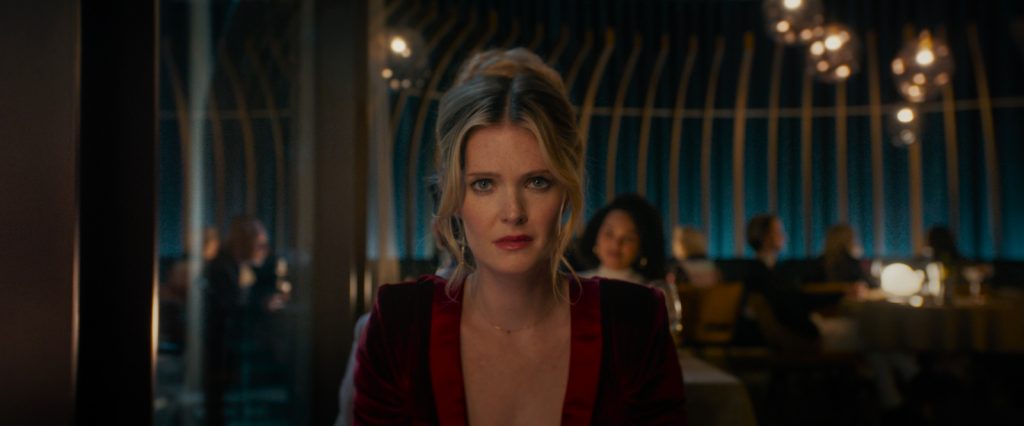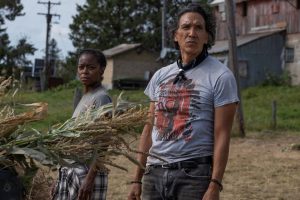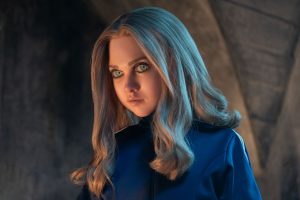Reviews include 40 Acres, Jurassic World: Rebirth, and Sorry, Baby.
TFCA Friday: Week of April 11
April 11, 2025

Welcome to the TFCA weekly, a round-up of reviews and coverage by members of the Toronto Film Critics Association.
In Release this Week!
The Amateur (dir. James Hawes)
“A significant step up in star power and resources from its Canadian predecessor, director James Hawes’s new film might be best elevator-pitched today as Mr. Robot meets Jason Bourne, with a tiny gore-free dash of Saw. Just outside of Langley, Va., the mild-mannered and vaguely autistic tech wiz Charles (Rami Malek) lives a comfortable life with his wife Sarah (Rachel Brosnahan). During the day, Charles is a crack cryptographer for the CIA, working in a windowless office with his fellow data-crunchers,” says Barry Hertz at The Globe and Mail. “During the evenings, he’s mostly doting around Sarah, who is either a lawyer, business executive or someone else whose vaguely described profession involves a lot of international travel to conferences. The details don’t matter much because very quickly, Charles’s world is shattered when Sarah is killed during a terrorist attack in London.”
“Stuck somewhere between being a clone of Three Days of the Condor and Death Wish at the same time, The Amateur doesn’t satisfy as a smart spy thriller or a dumb, bloodlust driven bit of exploitation,” says Andrew Parker at The Gate. “It’s also a very dumb movie that’s trying very hard to insist that the filmmakers are trying to make something smart and thoughtful, taking itself way too seriously for something that doesn’t hold up to close scrutiny.”
“The script effectively rights Rami Malek’s character Charlie as a man trying to find logic in a world of espionage and double talk where there really isn’t any as he leverages every situation that he can to the best of his ability. No one really takes him seriously which is obviously the folly of those in power who are ultimately trying to dismiss him or just get him out of the way,” notes Dave Voigt at In the Seats. “It’s an incredibly well written character and to his credit Malek knows how to play this guy inside and out. He’s our protagonist and action hero surrounded by players who for the most part dismiss him and what he’s capable of.”
“Written by Ken Nolan, Gary Spinelli and Robert Littell and directed with efficient technicality, the international hunt for a CIA decoder’s wife’s killers takes him through Europe,” says Gilbert Seah at Afro Toronto. “The excellent espionage thriller has the feel of two cinema classics – Francois Truffaut’s The Bride Wore Black and Fred Zinneman’s The Day of the Jackal.”
Autobiography (dir. Makbul Mubarak)
“Director Mubabrak proves himself an excellent director in his debut feature, his camera both doggedly tagging his characters while accomplishing some magnificent night shots as well,” says Gilbert Seah at Afro Toronto. “Through the capsule examinations of these two, one can see the problem balloon into the political and social problems of the country Indonesia.”
The Dad Quest (dir. Salvador Espinosa)
“At the one third mark of the movie, the film reruns serious, when the news that Benito is not Gallo’s son. At this point the duo take it upon themselves to find out Benito’s real biological father,” writes Gilbert Seah at Afro Toronto. “The many possible candidates take the two on a road trip around Mexico which is neither amusing, dramatic or funny. Or does anything make any sense? The word to describe all of these event is tedium resulting in an incredibly boring film in which no one cares about any of the story’s characters.”
Drop (dir. Christopher Landon)
“While there’s no denying that much of Drop plays like absurdist dinner theatre on steroids, it’s kind of why it works because the film leans into its more stylized beats to remind us that we’re just here to have fun and no one is ACTUALLY going to die,” says Dave Voigt at In the Seats. “Ultimately, Drop manages to be one of those genre defying pieces that you can’t help but get wrapped up in and it serves as such a great gateway for people who want a little more horror in their lives but ultimately want to have some fun with it at the same time. This is really quality popcorn grade entertainment that isn’t afraid to take its rollercoaster ride for a lap through the funhouse mirrors to make us appreciate the entertainment in the “moment” that a movie like this provides in spades.”
“Drop pivots into full Hitchcockian paranoia. Violet, forced to keep the text secret or her son dies, repeatedly excuses herself from the table, leaving Henry alone with nothing but a menu and a glass of Malbec, his manner growing from concern to impatience. It can be like watching a toddler unable to stay seated at the table,” writes Thom Ernst at Original Cin. “Drop thrives on improbability, scattering logic like marbles from a shattered bowl, leaving the characters scrambling to keep the story’s internal logic afloat. But Fahy and Sklenar navigate the shifts in the film’s tone and handle the near acrobatic efforts it takes to maintain believability.”
“Drop is an efficiently produced suspense nail biter with a combination of action, suspense, humour and some romantic comedy added for good measure,” says Gilbert Seah at Afro Toronto. “The filmmakers know that the material is not to be taken seriously and thus deliver a film that works that way.”
“A resourceful thriller built around someone trying to decipher which restaurant patrons are responsible for threatening her family, Drop is one of those films where the viewer is tempted to follow along with the protagonist in their quest to find a killer and blackmailer hiding in plain sight,” writes Andrew Parker at The Gate. “While it’s all in good fun and worth buying the ticket and taking the ride, just sit back and don’t try to think too hard about all of this works and any of the logic behind it.”
“While the screenplay by Jillian Jacobs and Chris Roach is tainted by some truly atrocious dialogue and a big twist that isn’t much of a twist at all, director Christopher Landon injects the entire affair with so much stylistic verve and narrative propulsion that, like the best kind of first date, it whips by almost too quickly. Landon also creates what might be one of the best contemporary ‘texting’ movies since Jaume Collet-Serra’s 2014 thriller Non-Stop – the many messages sent to Violet’s phone are visualized in a way that complement the spatial composition of each frame, rather than messily crowd them,” says Barry Hertz at The Globe and Mail. Hertz also chats with Landon about dropping out of Scream 7 and making Drop: “I would definitely say that was a big part of it. I was excited about the project, and we had a great script and an exciting movie planned, but there’s not much more I can say about it. I’m very excited about the new movie and see what Kevin Williamson does with it,” says Landon. “It’s one of those things where I do believe in fate and the way that things play out, and I do believe that I was meant to make Drop, and he was meant to make Scream 7. I’ll be first in line on opening night.”
Frozen Hot Boys (dir. Tanakit Kittiapithan and Naruebordee Wechakum)
“The film is not to be taken seriously despite its triumph of the human will over adversity theme. The film is barely entertaining enough, verging on the point on silliness,” says Gilbert Seah at Afro Toronto. “Forgettable guilty fun for those able to sit through the somewhat predictable silliness.”
G20 (dir. Patricia Riggen)
“Its not a new idea either in life or on film, but it’s a popular entertainment premise. The idea of a destabilising government, hijacking and threatening government, like the trump inspired US Capital riots, the White House Down and the London Has Fallen series,” observes Anne Brodie at What She Said. “Director Patricia Riggen makes sure the action is fast and furious but the experience is more linear than fleshed out and feels like a video game.”
“Viola Davis steps into the role of embattled President ‘Bad-Ass’ (a.k.a Danielle Sutton) pretty effortlessly as a war hero thrust into public life and she never betrays the airs or the ideal of being a flawed on screen action hero, thrust into a situation that forced her to do the right thing,” writes Dave Voigt at In the Seats. “Had Harrison Ford and Air Force One not been around back in 1997 and replaced with this script we may have very well seen the one and only Meryl Streep kicking ass and taking names with the same gravitas that Viola does here.”
“Falling somewhere in line between Air Force One, Die Hard, and Murder at 1600, G20 feels firmly indebted to maximalist 1990s’-early 2000s’ action filmmaking,” says Pat Mullen at That Shelf. “It’s consistently entertaining with a healthy mix of spectacular action and comedic relief. It’s the kind of film that offers ideal big screen popcorn movie escapism. However, with its release on Prime Video, the perfect ‘Saturday night with a frozen pizza’ movie with or without the family will do. And a second term for President Davis would probably do America a world of good. Let’s hope there’s no tariff on frozen pizza.”
One to One: John & Yoko (dir. Kevin Macdonald, Sam Rice-Edwards)
“Macdonald’s doc captures the atmosphere, spirit and emotions of the John & Yoko’s period in New York City as well as their work and convictions,” notes Gilbert Seah at Afro Toronto. “One feels totally immersed in the culture while being entertained by the music and performances.”
“John and Yoko’s frequent late night TV appearances are legendary – insisting hosts book radicals like Jerry Rubin and Allen Ginsburg, considered to be Commies! and Yoko called the other Beatles chauvinists!” notes Annew Brodie at What She Said. “They attended the Nixon Watergate hearings and were able to carry out good deeds while rattling conservative cages. The film moves at a pace, crammed with news footage, an almanac of 70s American history as much as the story of John and Yoko. And yes Yoko sings. You have been cautioned.”
At the Toronto Star, Peter Howell chats with Sean Ono Lennon about executive producing a film about his parents: “I think what surprises me more is that my mother is so comfortable with the attention because she was not a rock star. She was quite a successful artist before she met my dad, but the amount of attention that they got as a couple would have been daunting, I think, to most people,” he says. “And she seems to really not only be comfortable with it, but she seems to know how to take advantage of the attention to promote their ideals. I often say that John and Yoko invented reality television and memes because writing ‘Hair Peace’ and ‘Give Peace a Chance,’ and doing the bed-ins and all these performative political pranks, feels a lot like the modern world in which people use memetic memes to spread ideas.”
“The 44 years since Lennon’s death have yielded an astonishing number of documentaries about the Beatles, collectively and individually. For their relatively brief period spent working together, seemingly every inch of their public and private lives has been documented, examined, restored, and documented again. Beatlemania never dies, but one’s interest in it may have an expiry date,” admits Pat Mullen at POV Magazine. “The latest doc in the Beatles cinematic universe is One to One: John & Yoko. It’s a rather lovely film, if a familiar one. The Beatles movies are all a blur at this point.”
Pets (dir. Bryce Dallas Howard)
“It’s all that’s needed to grab attention, and watching is a lovely experience. Children tell us what is special about their pets, how they make them feel and what they can do for them,” notes Anne Brodie at What She Said. “One little girl breaks into sobs speaking of her enormous love for her bundle of joy, as happens again and again, straight through to adults. Pets ranging from dogs, cats, horses, pigs, birds of prey, goats, rodents, reptiles and even wild marine animals show the range of beings that can emotionally interact with humans. And it highlights our soft side, as seen in social pet and human stars.”
“Pets plays like a documentary anthology with several pet stories strung together but with a loose connecting thread of children being interviewed,” says Gilbert Seah at Afro Toronto.
Resident Orca (dir. Sarah Sharkey Pearce and Simon Schneider)
“Anyone who sees the film, witnessing the recognized intellectual and emotional capacities of these magnificent mammals, can’t help but be moved by co-writer/directors Sarah Sharkey Pearce and Simon Schneider’s at-once maddening, inspirational, and ultimately, heartbreaking film,” says Kim Hughes at Original Cin. “Wads of Kleenex recommended.”
Sacramento (dir. Michael Angarano)
“”Built around a complex male friendship that’s both nurturing and toxic at the same time, director, star, and co-writer Michael Angarano’s second feature effort examines failed coping mechanisms and unchecked neuroses with intimate, amusing detail and a warm heart,” notes Andrew Parker at The Gate.
“My only complaint with the film is that it has a tendency to mistake extreme emotional moments with meaningful ones. And that it criminally underutilizes Stewart. And that Cera’s mental issues, while bordering on the psychotic, are never treated as anything more than a quirky character flaw,” says Chris Knight at Original Cin. “I just wish that story had about 15 per cent more oomph. It’s like heading from L.A. to Sacramento and only getting as far as (checks Google Maps) Grizzly Hollow. Trust me, that’s not all the way.”
“Sacramento is such a classic independent American film that it runs the risk of being a cliché. It’s in the well-travelled road film genre in which a couple of friends bond together while driving in a run-down old car, replaying their past lives and intermittent present dreams. If the film had been made years ago, it might have been considered to be brilliant,” says Marc Glassman at Classical FM. “After all, Easy Rider, Paper Moon and Thelma and Louise were all hits, dramatizing relationships forged on the road ranging from two drug-dealing motorcyclists to a father and daughter duo of con artists to a couple of women on the lam from cops. But now, after so many variants have run their vehicles down this particular highway, what is left to be said?”
Shadow of God (dir. Michael Peterson)
“The fault lies in both Peterson’s direction and Tim Cairo’s script. The film is unfocused and all over the place,” notes Gilbert Seah at Afro Toronto. “None of the story’s characters are worthy of the audience’s sympathy. The story also contains a coven of demon worshippers that appear from nowhere and then are totally destroyed in a minute. Despite some quite well-executed special effects, the film turns out to be quite boring and unimaginative from the start to end.”
Warfare (dir. Alex Garland, Ray Mendoza)
“So why did Garland make a movie devoid of character growth, political examination or commentary? To explain, he tells a story about the time he was backpacking through Vietnam and stumbled across an establishment called The Apocalypse Now Bar, named after the 1979 Francis Ford Coppola movie. Given the film’s stunningly bleak depiction of war in Vietnam, Garland saw the contrast as ironic. Using poetry, music, set design — and yes, story — Coppola was able to construct a movie with a message that reaches across decades. One that holds so much cultural cachet that a bar owner in Vietnam was willing to ignore the blood-soaked title, and use its allure to attract starry-eyed Western backpackers,” says Jackson Weaver at CBC. “Garland and Mendoza view making a movie with that level of manufactured emotion as a mistake, and it wasn’t something they wanted to repeat.”
“Warfare doesn’t have a plot to speak of. It follows a brutal firefight from start to finish; no stopping to add storylines or to give characters backstory,” adds Andrew Parker at The Gate. “The plot is survival. The unit of soldiers is the only character. And as a depiction of the chaos of battle, it has a degree of subtlety that makes a major impression on the viewer and balances out all of its brutal violence and grief. Tandem writer/directors Garland and Mendoza get maximum mileage out of an incident that has been stripped to the gristly bones.”
“While Garland’s Civil War was agonizingly vague and rather cowardly in its refusal to define exactly what its central schism was about, for fear of offending a portion of its potential audience, Warfare is more politically confused. No one on-screen talks about why exactly they have travelled halfway around the world to die, but every single body (and the soldiers are all bodies, more so than people) is set up as a paragon of courage and honour, proud to defend something, even if it ultimately ends up being a big old nothing,” writes Barry Hertz at The Globe and Mail. “This war-is-hell-but-warriors-are-forever mentality is given another backward salute in the film’s bizarre and lengthy closing montage, during which images of the cast are juxtaposed against the Iraq vets who they are playing.”
File Under Miscellaneous
At The Globe and Mail, Barry Hertz reports on the state of theatrical moviegoing at CinemaCon: “Prior to the pandemic, studios had been begging theatres to shorten the “window.” The argument: Most movies earned the bulk of their box office during the first few weeks of release, so why should studios not be able to move the title along to its next downstream market (VOD, streaming, cable), where it can more immediately deliver a fresh source of revenue?” asks Hertz. “More money, after all, means that the studio can make more movies. Exhibitors, though, felt anything less than a 72-day window would cannibalize their business, and essentially threatened to boycott any studio that refused to play by their terms. But then the pandemic came along, theatres were crippled, and studios such as Universal used the crisis as cover to punt movies to digital markets as little as 17 days after they open in cinemas.”
At What She Said, Anne Brodie previews National Canadian Film Day screenings, including Neil Young’s Coastal: “Young’s piano playing is gorgeous, delicate, tender, sweet, his music deeply familiar and comforting. It would have been good to see Hannah, we see her back as she scurries out of shots, but there you go.”
At POV Magazine, Pat Mullen looks at the alternate realities presented by October 8 and The Encampments: “October 8 and The Encampments share an affinity for point of view filmmaking, but both films unabashedly preach to the choir,” says Mullen. “They serve as comfort viewing that seeks to affirm a perspective one already has. However, documentaries should challenge viewpoints and not simply provide confirmation and reassurance. A film doesn’t have to flip one’s politics, but it should at least inform them and inspire self-reflection, rather than ignoring competing perspectives as a matter of convenience. But without engaging with context, information, and viewpoints outside their mission statements, some of these films invite a documentary no man’s land. That space looks to be widening.”
A Festival of Festival Coverage: Next Wave + Cannes
At Original Cin, Liz Braun looks at TIFF Next Wave film “It’s an oddly exuberant film. For all their travails, the reform school girls are entirely full of life — sitting together in a field after outdoor work, performing a spontaneous haka, dancing together in a classroom with absolute joy and abandon,” says Braun. “These youthful creatures are set in a breathtakingly beautiful landscape (and soundscape) and almost nothing seems capable of diminishing their energy or their capacity for hope. In friendship they find strength.”
At Classical FM, Marc Glassman looks at the Next Wave film Pools: “Sam Hayes has crafted a film that recalls the over-the-top hippie and biker flicks of the late Sixties and early Seventies. There are a lot of big scenes with the youthful leads dressing up in strange clothes, dancing frenetically and frantically making love. Much is made of revealing moments when people confess their feelings or talk about their fears. Inevitably all is forgiven—as it should be at that age.”
At the Toronto Star, Peter Howell reports on the Cannes lineup: “Frémaux said his programmers noted the ‘return of the genre’ — films of action, adventure and horror that often play well in multiplexes.
This is reflected in two of the most-anticipated titles premiering at Cannes ’25, one a drama and other a comedy but both described as spy thrillers: the Tom Cruise-led Mission: Impossible — The Final Reckoning, by Christopher McQuarrie, which will screen out of competition; and Wes Anderson’s The Phoenician Scheme, a Palme competitor starring Canada’s Michael Cera, Benicio del Toro, Mia Threapleton, Tom Hanks, Scarlett Johansson and a host of other stars.”
TV Talk/ Series Stuff
At Original Cin, Liam Lacey looks at the debut of Your Friends & Neighbors: “You really couldn’t ask for a better or more obvious casting choice than Jon Hamm as the star in the new Apple TV+ series, Your Friends & Neighbors,” says Lacey. “One reason Hamm feels so right for the part is pure familiarity. That’s not just because it’s another series (Breaking Bad, Ozark) about a rich white guy who takes a mid-life career turn into crime. Rather, ‘Coop’ can be seen as an updated version of Hamm’s defining role, that of Don Draper, morally tarnished alpha-male advertising executive in Matthew Weiner’s 1960s-set series Mad Men (2007-2015).”
Also at Original Cin, Jim Slotek chats with Kenny Russell of People of Comedy: Celebrating 30 Years of the Nubian Show about a legacy of standup comedy and his relationship with Russell Peters: “‘It was a real pleasure for him to come back and do the show,’ Robinson says of Peters’ closing set. ‘He’s got a thousand different reasons why he can’t, and we certainly couldn’t pay him what he was worth.’ But the relationship between the two remains intact. ‘When my brother was in Chicago in the VA hospital with his issues he had, he had an Indian doctor who said he saw Russell in Houston. So, Russell gave me an autographed CD that I gave to this doctor. I’ve got this guy trying to save my brother’s life, and he’s dropping Russell’s name.’”
At What She Said, Anne Brodie has a lot of fun with Government Cheese: “Really funny, wild and definitely surreal. Also, it’s 1969 and the clothes, home décor and speech are joyously ripped from the times.” Meanwhile, the mystery thriller Towards Zero “positively vibrates with movement and tension.” And Final Vows is a “remarkable documentary [that] gives us access to a world we rarely if ever are privy to.” She also really likes North of North, starring Anna Lambe: “It’s zippy, optimistic, funny, warm and loaded with Siaja’s quirky sarcasm; Lambe is going places!:



